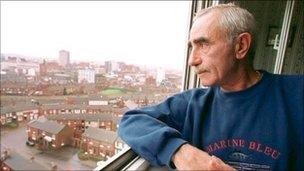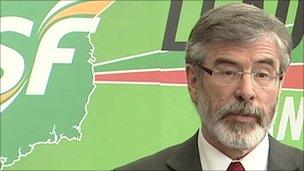Explosive Troubles interviews set to surface?
- Published

Brendan Hughes was one of the former IRA men who took part in the project
In the bowels of the Burns library at Boston College, some of the most interesting secrets of the peace process, and the violence that preceded it, are held in secure storage.
Among the documents are the details of what happened during the decommissioning process.
The British and Irish governments agreed that Boston College, with its enduring interest in Northern Ireland, would be a suitable and safe long-term repository for the controversial papers.
Also held there are a series of candid, confessional interviews with former loyalist and republican paramilitaries, in which they chronicle their involvement in the Troubles, and name names.
The 'Belfast Project', was designed to become an oral history of the Troubles, directed by the writer and journalist Ed Moloney, with the interviews carried out by two researchers.
Loyalists were recorded by Wilson McArthur, republicans by the former IRA prisoner Dr Anthony McIntyre, who has since become a writer and academic.
The deal was this: The former terrorists would tell their stories in secret, on the understanding that the recordings and transcripts would only be made public after their deaths.
Their testimonies, according to Boston College, would serve as a historic tool from which the mistakes of the past could be better understood.
Two of those interviewed, David Ervine of the Progressive Unionist Party, and the former IRA Commander Brendan Hughes have since died.
Their stories formed the backbone of a book by the project director, Ed Moloney, and of a television documentary.
In those Hughes made some frank admissions.
He said that he had organised 'Bloody Friday', the day on which the IRA detonated over 19 car bombs in Belfast in the space of an hour.
Nine people were killed, 130 were injured. Images of police officers shovelling the mutilated bodies of the victims into bags are some of the most enduring of the Troubles.
Hughes also spoke of his once close friend, the Sinn Fein leader Gerry Adams.
Hughes named him as overall commander of the IRA's Belfast brigade.
He also claimed that Mr Adams had controlled his own squad within the IRA, known by the organisation as "the unknowns".
This, according to Hughes, was the group responsible for the 'Disappeared', those who were kidnapped, murdered and secretly buried by the IRA.

Gerry Adams has said he has nothing to fear over the tapes
Mr Adams has strenuously denied the claims, and has pointed out that he and Brendan Hughes came to differ on the route Sinn Fein was taking.
In the latter years of his life Hughes had become an ardent critic of his former friend.
However, another former IRA member later gave an interview to a newspaper journalist, in which she admitted that she had also taken part in the 'Belfast Project'.
Dolours Price had been one of the IRA gang that blew up the Old Bailey in 1973.
In that interview, she allegedly claimed to have been the person who drove one of the Disappeared to her death in 1972.
Jean McConville was a west Belfast-based mother of 10, who had been accused by the IRA of passing information to the British.
Her remains were found buried on a beach in the Irish Republic, 30 years after she went missing.
The Police Service of Northern Ireland says that it has re-opened the inquiry into Mrs McConville's murder, and on that basis is seeking the transcripts of the interview Dolours Price apparently gave to Anthony McIntyre and Boston College.
Initial court decisions in the United States have accepted the PSNI's interest as legitimate, and the tapes of the Price interview and seven others deemed pertinent to an investigation into the disappeared are now in the hands of the US federal court.
A US appeal court adjourned on Wednesday to consider if those interviews can be withheld from the police.
Dr McIntyre and Mr Moloney say that it breaches the agreement struck with the interviewees, that it is a violation of their right to protect their sources, and that any hand-over of the material will place them in danger of attack by republicans.
Boston College is also appealing the decision to hand over the tapes, but separately.
The college says that it has no grounds to protect the anonymity of Dolours Price, given that she effectively 'outed' herself in the newspaper interview.
In June, Boston College will however try to stop the handover of seven other IRA interviews, querying their value to any investigation into the disappeared.
All of this has led to a bitter dispute between the researchers on the project, and the college, both of whom accuse the other of bad faith.
Boston College says that it agreed to protect the interviewees as far as the law would allow, and that Dolours Price exhausted their ability to do so by her admissions.
Ed Moloney and Anthony McIntyre feel that Boston College folded without a fight, and that they have been let down by their former employers.
For his part Mr Adams insists he has nothing to fear from any disclosure, and denies all of the accusations levelled at him.
- Published24 January 2012
- Published22 January 2012